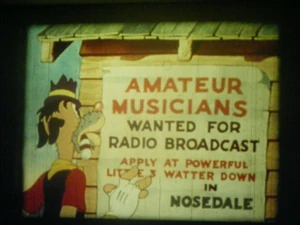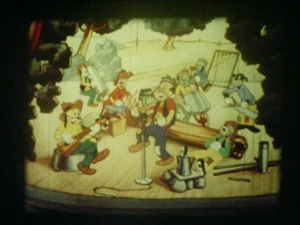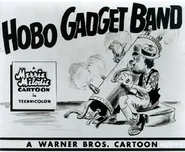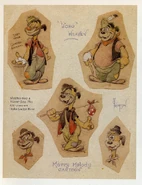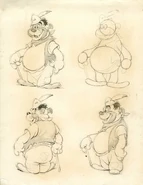Hobo Gadget Band is a 1939 Merrie Melodies short directed by Ben Hardaway and Cal Dalton.
Plot[]
At the hobo hotel, it's morning. One hobo awakens and carefully avoids the shower, except for a drop on each eye. He stops at the medicine cabinet for some "soda fizz," which jets about, causing havoc. A train goes by, and the swinging rhythm inspires a makeshift clarinet solo. The cook grabs some fish from the fridge, which opens right onto the river. Another train whistle prompts an announcer; the hobos board a slide. The clarinet player starts up again, and everyone dances. The engineer notices, stops the train, and pulls the "hobo eliminator" lever, which ejects them. Fortunately, they land right in front of a sign looking for amateur musicians at a radio station. They play and sing, to everyone's enjoyment. The station owner offers them luxury, but a passing train whistle changes their minds.
Caricatures[]
- Jim Jordan - the train announcer briefly quotes his character Fibber McGee from Fibber McGee and Molly: "All of the kinds of places like that there."
Television[]
- a.a.p. (1957-mid 1990s)
- Bugs Bunny and Friends [TBS] (1979-late 1980s)
- Tom and Jerry's Funhouse [TBS] (1986-1997)
- Bugs Bunny and Friends [TNT] (1988-1998)
- The Popeye Hour [TNT] (1988-1998)
- Bugs and Daffy Tonight [Cartoon Network] (1992-1994)
- The Bugs and Daffy Show [Cartoon Network] (1995-2004)
- Acme Hour [Cartoon Network] (1998-2003)
- Looney Tunes on Boomerang (2003-2005)
- TCM (2004-2007)
Availability[]
The Golden Age of Looney Tunes Volume 4, Side 8: Ben Hardaway & Cal Dalton (and Private Snafu)
Notes[]
- The working title was "Hobo Heaven".
- When the lead hobo partakes in his "Soda Fizz" (or as he calls it, "Sodium Acetylsalicylate"), he states "Listen to it fizz"; which was an early catch-phrase for the Alka-Seltzer brand in the 1930s.
- The sign that mentions there is a musical audition "at powerful little 3 watter down in Nosedale" is a reference to Uncle Ezra’s Radio Station.
- While the American Turner "dubbed" version print uses the post-Schlesinger dubbed ending card, the European dubbed version uses the Schlesinger dubbed ending card. This also happens on the European dubbed versions of "Fox Pop", "A Feud There Was", and "I Only Have Eyes for You". The American Turner dubbed print also alters the ending rendition of "Merrily We Roll Along" to the 1941–55 rendition, while the European dubbed print retains the original ending music.
- Vitaphone release number: 8859
Gallery[]
References[]
- ↑ Catalog of Copyright Entries
- ↑ Scott, Keith (20 September 2022). Cartoon Voices of the Golden Age, Vol. 2. BearManor Media. ISBN 979-8887710112.
- ↑ 3.0 3.1 3.2 https://tralfaz.blogspot.com/2021/04/todays-1939-radio-reference.html
- ↑ 4.0 4.1 Webb, Graham (2011). The Animated Film Encyclopedia: A Complete Guide to American Shorts, Features and Sequences, 1900-1999, 2nd ed., McFarland, page 162. ISBN 978-0786449859.







